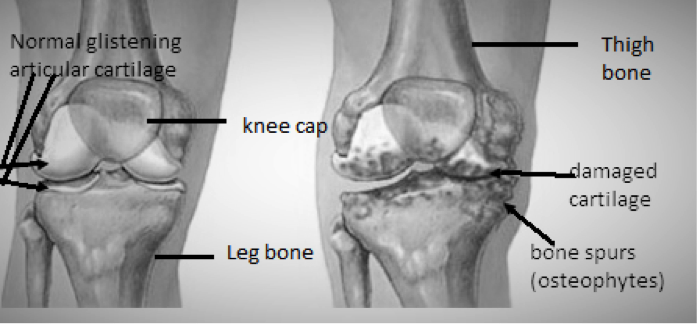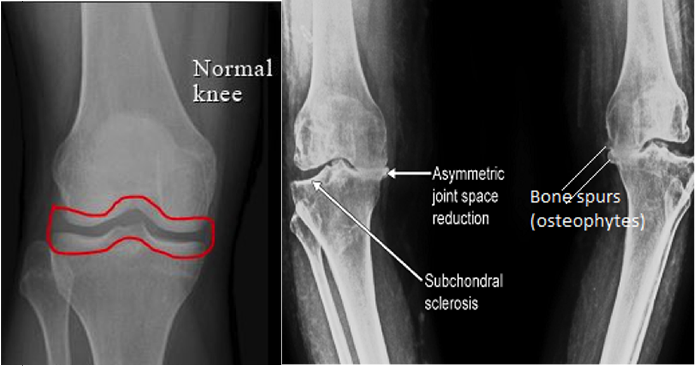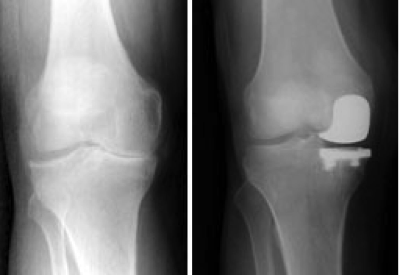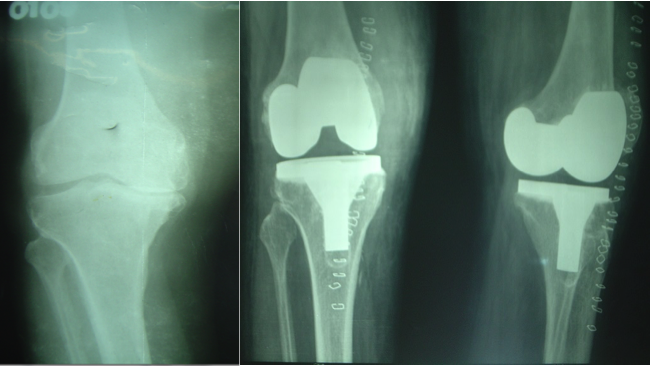Overview:
Total Knee Replacement is one of the most frequently done and successful treatment for severe knee arthritis. Knee arthritis is mostly degenerative which happens as age advances. This is called osteoarthritis. Other common type of arthritis is rheumatoid arthritis. With advancing arthritis patient finds difficulty in walking, climbing stairs or sitting on floor. For early knee arthritis conservative treatment like pain killers, exercises and walking aids are helpful. With increasing arthritis one may find it quite difficult to pursue his routine day to day activities and nonsurgical treatment may fail to relieve pain. Total knee replacement is safe and successful procedure for advanced arthritis.
Today more than 200,000 knee replacements are being done in India every year. Improvement in technology and instrumentation and understanding of knee biomechanics has improved the outcome of knee surgery drastically. Today average longevity of knee prosthesis is more than 15 years.
Causes of damage of the knee: Two most common causes are osteoarthritis and rheumatoid arthritis. Osteoarthritis mostly occurs with advancing age (above 60 years) whereas rheumatoid arthritis may affect younger individuals.
Management:
Knee joint is formed between thigh bone (femur), leg bone (tibia) and knee cap (patella). When we walk glistening surfaces of leg, thigh bones and knee cap, which are covered by articular cartilage, move on each other. Arthritis is actually the damage of this articular cartilage. With damage of articular cartilage joint space reduces and new bone spurs (osteophytes) form around knee joint.

Diagnosis:
Diagnosis is obvious when an old age patient gives typical clinical history of pain in walking and climbing stairs. On examination joint line tenderness is classically present. Crepitus may be felt (sound heard and felt with knee movements) in advanced arthritis. X ray of an arthritic knee is always taken in standing position to assess the joint space. This space is typically reduced in arthritis.

Who needs Total knee replacement?
Decision of knee replacement should actually a mutual agreement between patient and surgeon. If knee pain troubles you in doing day to day routine activities like walking, using stairs etc, and your standing X ray shows loss of joint space you are right candidate for this surgery.
Patient Preparation
Day before surgery you are admitted to hospital for some blood and urine investigations, ECG, ECHO and chest X ray. Total knee replacement is done under combined spinal-epidural anaesthesia for which you have to be fasting for 8 hours before surgery. Hairs from the operating side are removed in the operation theatre before surgery. If you are on blood thinner drugs (Aspirin, clopidogrel), these drugs are stopped three to five days before surgery. Patient on anti-rheumatoid drug should continue these drugs. Some patient of rheumatoid arthritis might be on oral steroids which needs to be substituted by injectable dose of steroid on the day of surgery.
Indications
- Damaged knee with advanced arthritis (osteoarthritis or rheumatoid)
- Osteonecrosis (death of bone cells ) collapse of femoral condyle
- Post fracture secondary arthritis
- Gouty arthritis
Contraindications
- Knee infection
- Remote or ongoing sepsis
- Knee extensor mechanism insufficiency (damage to thigh muscle)
- Severe muscular weakness
Types of Knee Replacement:
Unicondylar Knee replacement (UKR)
Three compartments of knee joint are outer, inner and patella. When only one compartment (outer, inner or patella) of the three compartments in the knee is affected, UKR is indicated. In UKR only surfaces of only one compartment are replaced with prosthesis. This is indicated in early arthritis with involvement of only one compartment of knee joint.

Total Knee replacement
With advanced arthritis all three compartments are involved (outer, inner and patella). In total knee replacement surfaces of all three or at least two (patella may be resurfaced only without implantation of prosthesis) compartments are replaced with prosthesis. After bony cuts and ligament balancing bowing in or bowing out of limb is corrected and articulating surfaces are replaced with femoral, tibial base plate and a polyethylene insert. The patella may/may not be resurfaced.

Activities After Surgery
After surgery there occurs significant improvement in walking capacity, climbing stairs and other routine chores like biking, driving etc. You can also enjoy light sports activities like swimming, golf, and indoor games. High impact activities like running, jogging, outdoor games should be avoided.
Risks of Total Knee Replacements
Knee infection is most serious possible complication. Its incidence is around 1%. Heart and lung complications like pulmonary embolism are other dreadful complications but these are even less frequent. Blood clot in leg veins (thrombo-embolism) is common after joint replacement surgeries but effective preventive program are routinely instituted and include calf pumps, early mobilization, and antithrombotic medicines (blood thinners). Injury to nerves and vessels are rare but may occur.
Physiotherapy After Total Knee Replacement
After surgery you start walking on the next of surgery. Initially for two weeks you walk wearing a knee brace and with support of a walker. A physiotherapist gives you gait training (how you should walk) and teaches you exercises to strengthen muscles around knee joint. It takes 6 to 8 weeks to start routine activities. In the first two weeks physiotherapy focuses on pain and swelling control and gaining normal knee range of motion. Once you get sufficient range of motion strengthening exercises are started.
SPECIALITIES
OPENING HOURS
| Monday – Friday | 17:00 – 20:00 |
| Sunday | By Appointment Only |
+91-7357406805
CLINIC LOCATIONS
OUR PATIENTS SAY
We’re proud to receive some exceptional compliments from our patients and their family members. We fell very happy and blessed to see our patients recover.

मेरा दाए पैर में चोट लगने के कारण टेढ़ा हो गया था जिसकी वजह से मुझे चलने में भी परेशानी हो रही थी. डॉ जितेश ने ऑपरेशन कर के इसे सीधा किया. में बिलकुल ठीक हूँ .

Dr. Jain came out from his clinic to see my mother because my mother was not able walk a single step. He did total knee replacement on both side and now my mother is walking without aid.

मेरी बेटी के घुटने में इन्फेक्शन होने के कारण वो दर्द की वजह से सो भी नहीं पाती थी. डॉ जितेश ने ऑपरेशन कर के इसे ठीक किया. बहुत धन्यवाद।
